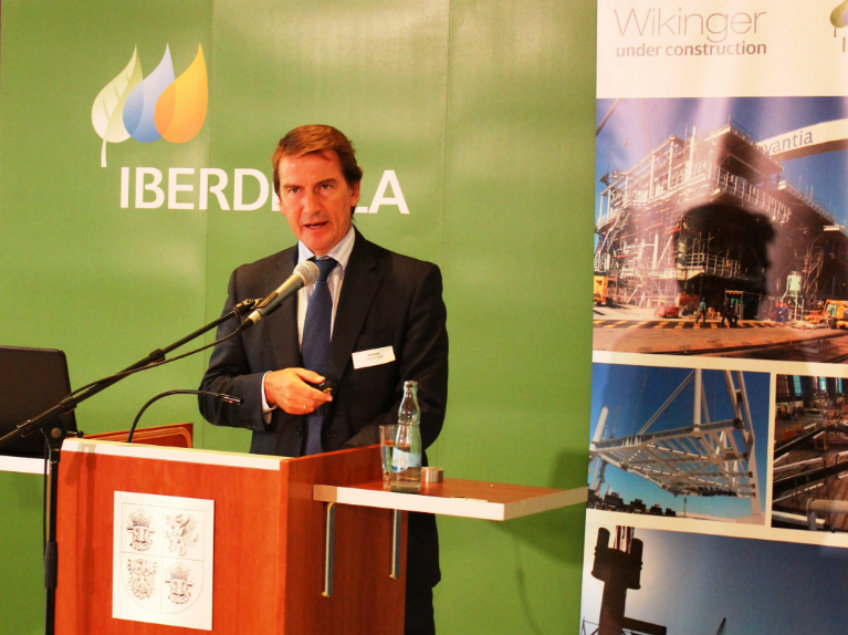Iberdrola was joined today by Adwen, Navantia, Offshore WindForce and Prysmian to introduce the €1.4 bn Wikinger offshore wind energy project to German companies and open a forum where local supply chain businesses can investigate collaboration possibilities with Wikinger contractors and partners.

Tanis Rey-Baltar, Project Director for Wikinger Offshore Windfarm
Supported by Christian Pegel, Minister for Energy, Infrastructure and Regional Development for Mecklenburg-Vorpommern, the local Chamber of Commerce and the Wind Energy Network, the first-of-its-kind supply chain event took place at the Landesvertretung Mecklenburg-Vorpommern in Berlin, with over 100 stakeholders and local suppliers with offshore wind experience in attendance.
During the sessions the project’s procurement strategy was discussed and the four main supply partners outlined their scope of works, enabling local businesses to understand more about possible collaboration opportunities.
With specific field studies and detail engineering now complete, as well as the certification, procurement and stockpiling of raw materials, IBERDROLA is progressing the manufacture of the project’s infrastructure and key wind turbine components.
Fabrication of piles and four-legged jacket foundations begun in May at the shipyards of Bladt, in Denmark, and Navantia in Spain. Work is also advancing at the Navantia shipyard in Puerto Real (Cádiz) for the manufacture of the steel structure and topside of the offshore substation that will support the windfarm. The scale of this work alone is huge – when complete, the offshore substation will measure 60 metres long and 22 metres wide, with two bases weighing over 4,800 tonnes.
Offshore WindForce, a project specific joint venture between Boskalis and Volker Stevin International (VolkerWessels) has been tasked with the transportation and installation of the jackets and offshore piles from different locations in Europe to the port of Sassnitz in the German Baltic Sea. In line with the construction schedule, the installation of the piles on site will commence in the spring of 2016. This will be followed by the installation of the jackets, an operation that is expected to be completed by the end of that summer.
Wikinger Offshore Windfarm will consist of 70 Adwen 5-megawatt (MW) turbines, bringing total generating capacity to 350 MW by 2017. Combining both Gamesa and Areva wind expertise and extensive track-record, the 50-50 joint venture is responsible for the design, manufacturing, installation, commissioning and servicing of the project’s wind turbines. In September, Adwen’s factory in Stade (Germany) begun manufacturing the wind turbine rotor blades while Bremerhaven site is being upgraded in order to start the tower and nacelle assembly from November 2015.
The project also features the participation of leading German, Dutch and Italian firms for the supply of electrical equipment, vessels and sub-sea inter array cables.
Prysmian is responsible for the design, manufacture, installation and testing of a total 81 km of 33 kV sub-sea cables in different cross-sections to connect the 70 wind turbines and the offshore substation. Cables are being produced in Drammen, Norway, one of the Group’s excellence centres for submarine cables. Installation works are scheduled to be completed by the end of 2016.
Having announced commencement of works in August, transmission system operator 50Hertz is progressing the third Baltic Sea interconnection project, a 93-km sub-sea cable linking planned offshore wind parks within the West of Adlergrund cluster, where Wikinger lies, and the onshore substation located in Lubmin.
The operations centre for the construction of Wikinger will be located at the port of Sassnitz in the state of Mecklenburg-Western Pomerania. Work is currently ongoing in preparing the port to house the operation and maintenance building, as well as the storage area for the various components and equipment needed in the construction stage. Key activities to be carried out at the port include the offloading of turbine parts, foundations, piles, jackets and cables, as well as pre-assembly and subsequent transportation to the site.
As well as promoting the creation of quality jobs in the region, Wikinger aims to provide business opportunities for local subcontractors, ranging from civil and electrical contractors, vessels and ports support, to technicians and logistics, which will have an overall positive impact on the regional economy.
Tanis Rey-Baltar, Iberdrola project director for Wikinger, said: “Wikinger will have a considerable impact in job creation and we want to do all that we can to source as many of these jobs as possible from the local area.
“We were very encouraged by the turnout today in Berlin, and we would like to thank the state of Mecklenburg-Vorpommern as well as the other supporting organizations for their help in putting the event together. It has enabled us to match skills and services with the needs of our contractors, who will now be able to engage directly with local suppliers and explore opportunties going forward.
“Major infrastructure projects like ours require support during planning, construction and operations, so we need the expertise and support of a wide range of companies with a variety of skill sets.”
